I rarely photograph raptors on utility poles anymore but I’ll always make an exception for Prairie Falcons. Especially when they allow me to observe some of their behaviors up close.
About five weeks ago I found a single adult Prairie Falcon on one of my trips to the west desert. Prairie Falcons are known for being difficult to approach and this one was spookier than most. ‘She’ simply refused to allow me any closer than several hundred yards.
Since that first encounter with her I’ve found her along the same line of utility poles four more times on different trips to the area. Each time she’s become more approachable, allowing me to get progressively closer to her for longer periods of time.
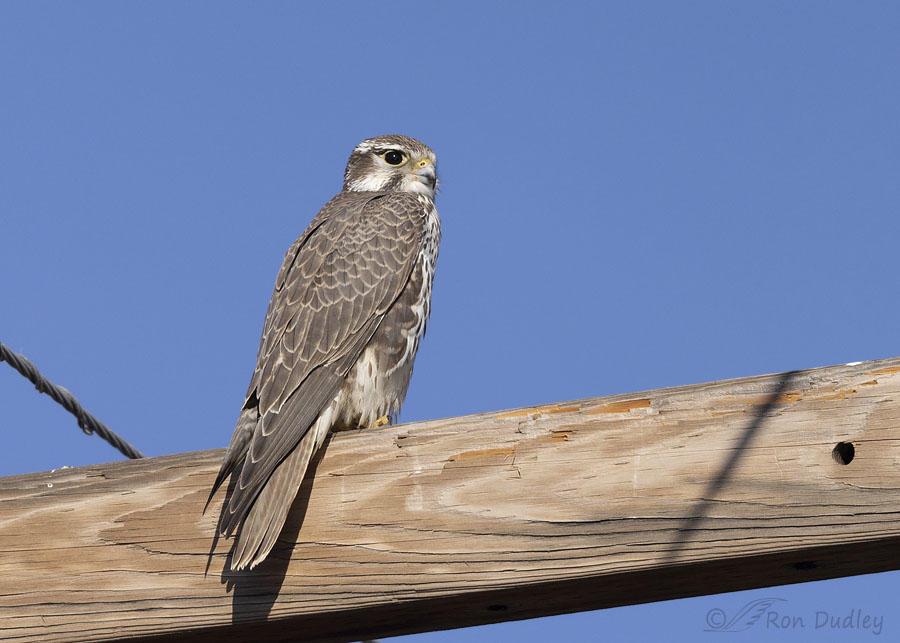
1/6400, f/5.6, ISO 640, Canon R5, Canon EF500mm f/4L IS II USM + 1.4 tc, not baited, set up or called in
Yesterday morning she allowed the closest approach yet. At first she was a little wary of me but she didn’t take off for a long time so I had plenty of opportunity to just enjoy being with her.
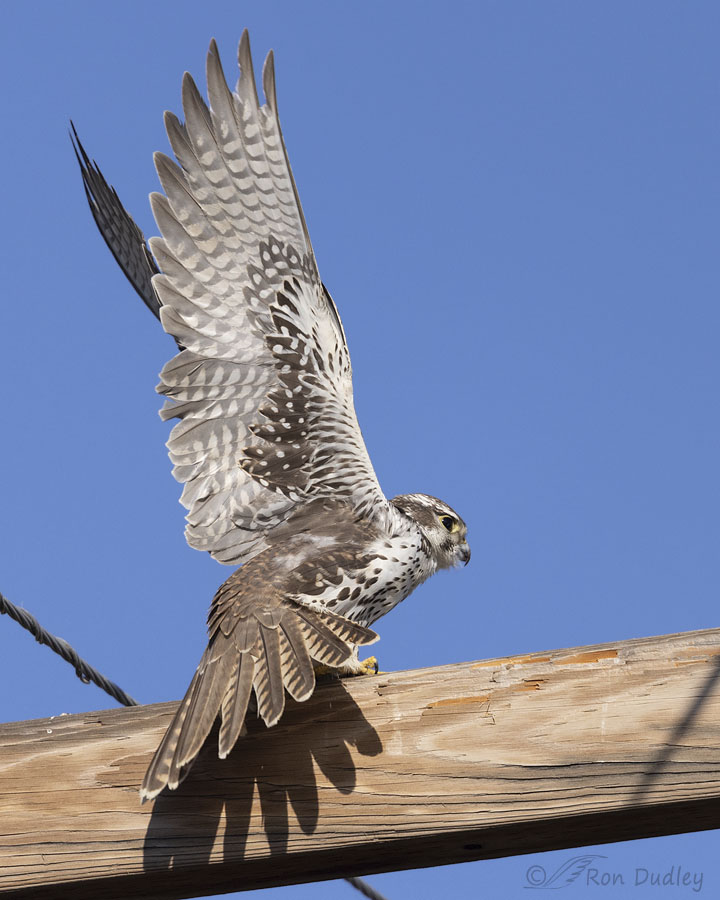
1/6400, f/5.6, ISO 640, Canon R5, Canon EF500mm f/4L IS II USM + 1.4 tc, not baited, set up or called in
When she eventually did take off it was an extremely quick and kind of quirky maneuver, which in my experience is fairly typical of Prairie Falcon launches. By “quirky”, I’m referring to the fact that she “flapped” her flared tail downward before she’d even left her perch, instead of while she was leaving it. But I appreciated the good look the unusual takeoff posture gave me of more of her plumage.
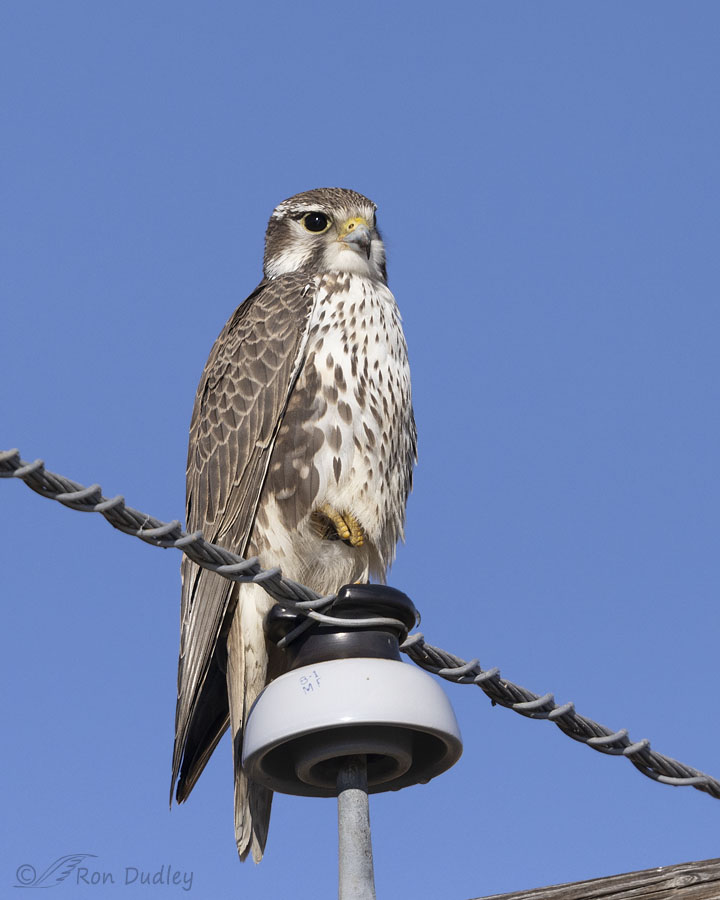
1/6400, f/5.6, ISO 640, Canon R5, Canon EF500mm f/4L IS II USM + 1.4 tc, not baited, set up or called in
She didn’t go far, only to one of the insulators on the next utility pole down the line and this time she was incredibly relaxed in my presence. Whenever I’m close to a raptor that pulls one of their feet up into their belly plumage, it’s a reliable indicator of their lack of nervousness.
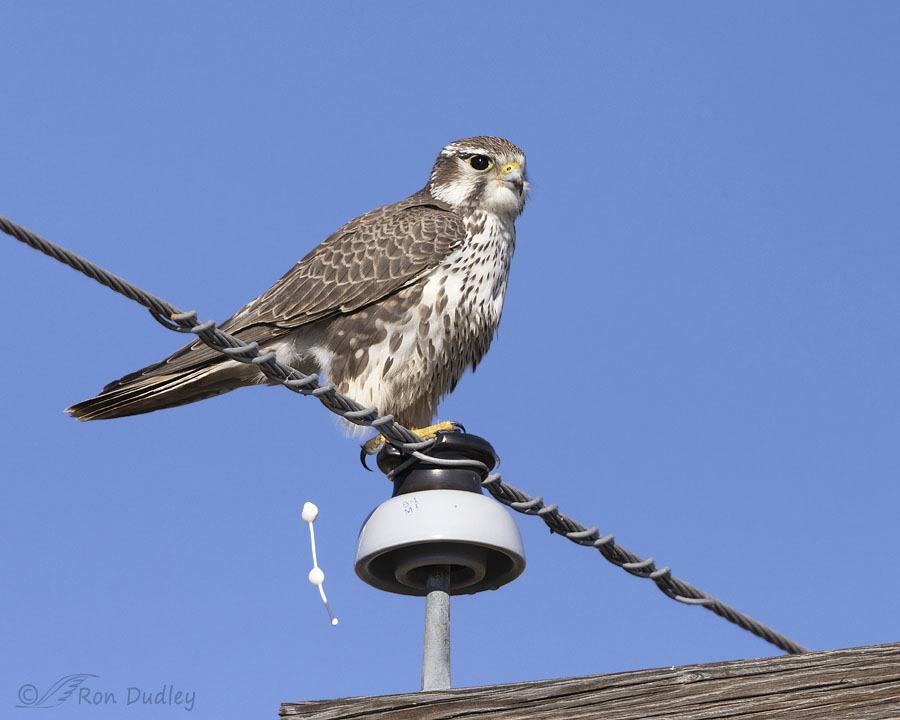
1/6400, f/5.6, ISO 640, Canon R5, Canon EF500mm f/4L IS II USM + 1.4 tc, not baited, set up or called in
This is the first time I can recall ever capturing a Prairie Falcon defecating. I hope that the almost pure white color of her ‘poop’, meaning that it’s composed almost entirely of white uric acid (a metabolic waste) with very little darker digestive waste mixed in, isn’t an indicator that she’s having difficulty finding enough to eat.
I’m thinking that’s probably not the case, since she’s been hanging around the same area for so long. If she wasn’t finding enough prey (mostly songbirds and rodents), she’d go elsewhere.
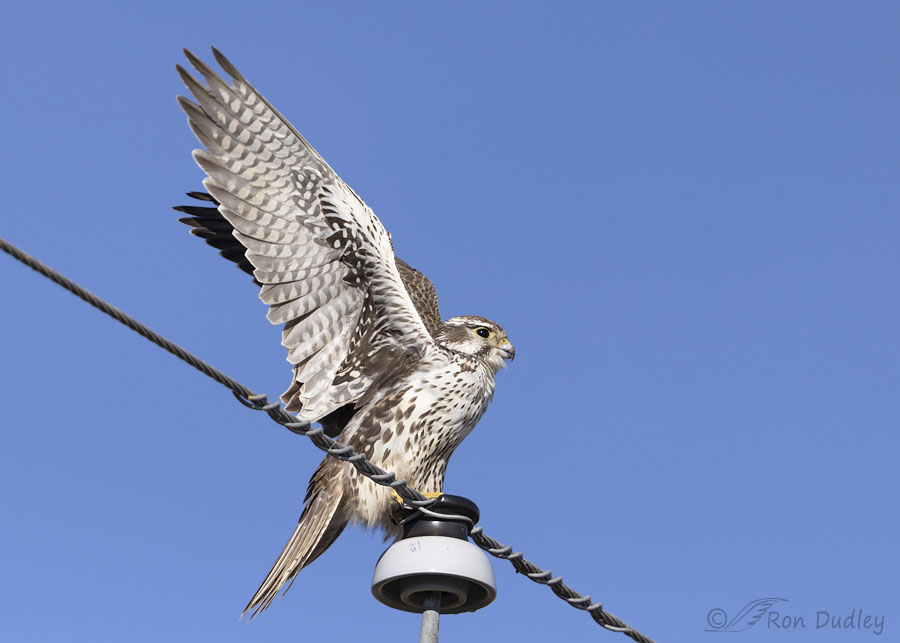
1/6400, f/5.6, ISO 640, Canon R5, Canon EF500mm f/4L IS II USM + 1.4 tc, not baited, set up or called in
When she took off a while later I got…
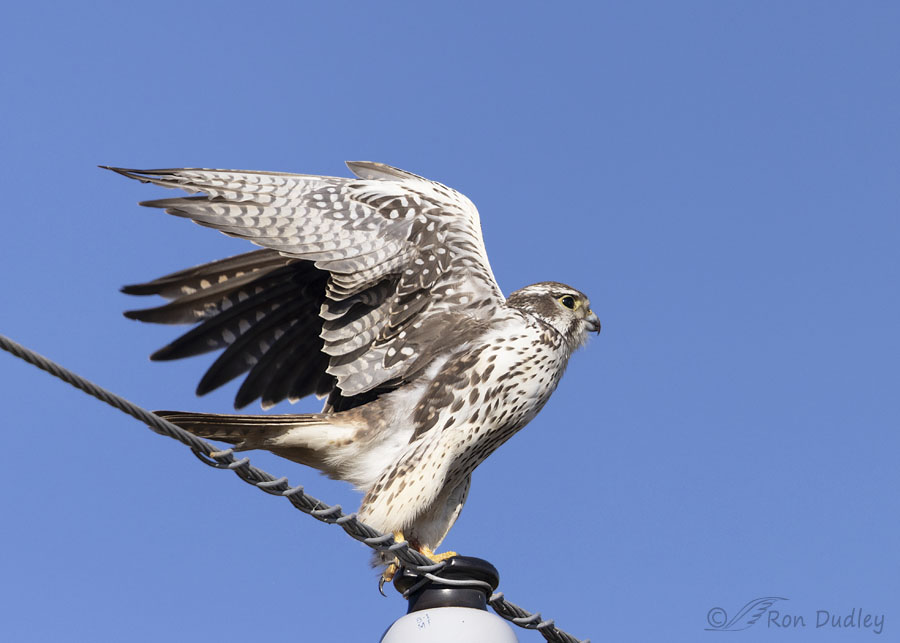
1/6400, f/5.6, ISO 640, Canon R5, Canon EF500mm f/4L IS II USM + 1.4 tc, not baited, set up or called in
three shots of the process but she turned her head away from me and…
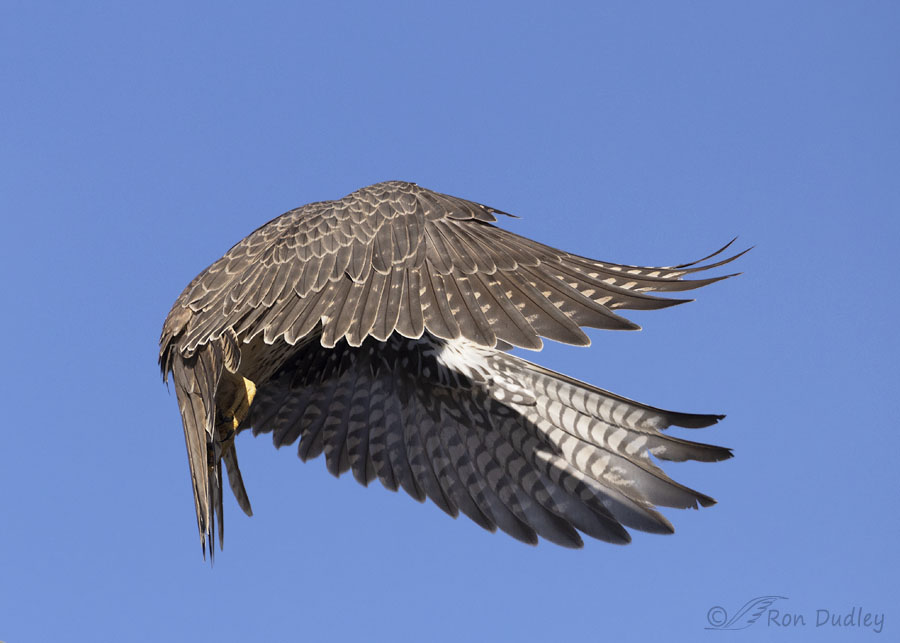
1/6400, f/5.6, ISO 640, Canon R5, Canon EF500mm f/4L IS II USM + 1.4 tc, not baited, set up or called in
the last shot was headless (except for the shadow of her head on her left wing). I still appreciate the good look at the plumage patterns of her right wing and I don’t recall ever seeing a view of a falcon’s partially deployed alula from this angle.
I’ll admit it. As time goes by and she becomes progressively more comfortable in my presence, the anthropomorphist in me is beginning to think of her as a dear old friend. Even though I realize that it’s much more likely that she’s just becoming more tolerant of vehicles on the road.
I hope she sticks around all winter.
Ron


I kinda like the headless shots. It reminds me of Swan Lake. How have you been?
How have you been?
I’ve had some challenges lately but I’m hanging in there.
Sensational series! Thanks for sharing!
Carlotte Norton
Thanks, Charlotte.
I’m enjoying all these images and the commentary today — Michael’s Prairie v Lark story is just wow! — and glad I’m finally resettled after being away awhile so I can rejoin the FP fan club. What a post to return to … and so great that this gorgeous falcon female is returning to her post(s), too, I hope it’s just the beginning of a fruitful season for you both!
Thanks, Chris. Welcome back. You’ve been missed.
Great pix! It’s clear birds with great eyesight are smart enough to realize humans are a real threat even if the bird is perched high in a tree or on a utility pole. But this particular bird evidently concluded you were safe.
The other day I saw a tiny lump near the fork on a faraway tree… I estimate about 200 yards away and maybe 80 feet off the ground. Viewing it at 3000mm with my Nikon superzoom camera the lump turned out to be a Cooper’s hawk, half hidden by branches. My body was mostly hidden by my car, just my head and arms were visible to the bird. But before I could get off a shot, the bird disappeared. I’ve noticed that many birds fly only if I point my camera at them, and otherwise stay put.
“I’ve noticed that many birds fly only if I point my camera at them”
That’s very true, Robert. In my experience it’s most likely to happen with species that have been considered vermin for decades and shot as a result. Birds like many corvids and some of the raptors.
What a lovely lady. I’m anthropomorphizing all over the place. I have a little “thought bubble” for her in each shot. At first she looks a bit concerned and by the end, she’s showing off (and showing her pantaloons to you — woo hoo!
At first she looks a bit concerned and by the end, she’s showing off (and showing her pantaloons to you — woo hoo!  ) Hope you get to see her often and hope she can get enough snackage to make sticking around worth her while.
) Hope you get to see her often and hope she can get enough snackage to make sticking around worth her while.
Thank you, Marty. If she’s finding enough food, I suspect she’ll be there all winter.
The Lord giveth and the Lord taketh away! A really beautiful bird in a really ugly setting. But, hey, she chose it, not you. Keep ’em coming!
I hope to, Kent.
Ha ha. I appreciate the observation of how difficult they are to approach. Prairie falcons were the inspiration for me to get a better camera and a lens — I was out with an old Canon Rebel T2i when I saw one on utility post (they must have some sort of symbiotic relationship with them as thats where I see them) and tried to photographic. While he looked wonderful in my binos, he was tiny and fuzzy in my photos — next Xmas my wife got me a better camera and lens so I could be prepared the next time I saw one.
That was an expensive bird for you, Kent.
I hope your strategy worked.
These are excellent shots! I don’t have much experience with Prairie Falcons and I’ve definitely never seen such great images of their coloring and wing patterns. What a delight!
Kathryn, I doubt many folks have much experience with Prairie Falcons, with the exception of some falconers who fly them. Thanks.
There does seem to be a change in her expression from the first shot to #3 where she’s pulled up her foot – like a dog who’s decided you are ok, the eyes relax just a tiny bit. Very interesting to see! What a beautiful bird!
You’re right, Carolyn – body language can be very revealing, including with birds.
Wow Ron, with your photographic skills matched up with that R5 you really get some super photos. These are the sharpest and best Prairie Falcon shots I have ever seen. Beautiful shots of a beautiful bird. I have only had one encounter here with one and I was able to get fairly close, but I certainly did not want to push it and lose her.
For raptors such as this one I would always take it utility pole or not.
Red-tails and other more common ones I would skip, but not a Prairie Falcon.
Thanks, Everett. It was very rewarding to finally got close to her for a long time, after so many previous failures over many weeks.
That must be a great experience! Real nice images.
It was, Bruce. Thanks.
Love the shots – just beautiful!!
Thanks, Dick.
Your series today is the best look I’ve had at this handsome bird–
what lovely markings ! When she raised her wings so that her ventral
markings were exposed, their “flow” reminded me of leaves coursing
over water……thanks for the visual treat !
It’s one of the better looks I’ve had of this species too, Kris.
I’m glad I didn’t ignore her, just because she was on a utility pole.
She is magnificent – and of course I admired her britches.
And yes, I totally understand the feeling that she is becoming an old, and valued friend.
I also appreciate your analysis of the poop shot – and hope you are right.
Thanks, EC. If I’m not right, I fully expect someone to point out my error. And I’d appreciate it if they did.
It is always a treat to see a Prairie Falcon. Love the insulator photo, and that last one is a nice photo to admire the feathers in such detail.
In my falconry days I knew of a few guys who flew Prairie Falcons. But the closest I ever got to one in the wild was on the Carrizo Plain. I had stopped on the dirt road and got out of my car to get a good look at a couple of Western Bluebirds on a fence. When doing so I had flushed a number of Horned Larks that were feeding on the ground nearby. I thought it odd that they did not go down the road a bit (as they usually do) but rather stayed in the air low overhead. A second later I see a Prairie Falcon come in (from where I do not know) and, seemingly without effort or change in speed, pluck one of the Horned Larks right out of the air not more than ten feet over my head. It is one of the most memorable birding encounters of my life.
“It is one of the most memorable birding encounters of my life.”
I can imagine it was, Michael. I’m jealous.
I’ve seen a Cooper’s Hawk do something similar but never a Prairie Falcon. Maybe someday…
Nice series, Ron…… Even tho headless the last picture is amazing to me.
Even tho headless the last picture is amazing to me.  Great to have “her” less spooky than she’s been.
Great to have “her” less spooky than she’s been.
Thanks, Judy. Glad you enjoy the headless shot.